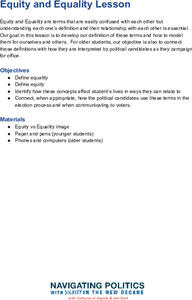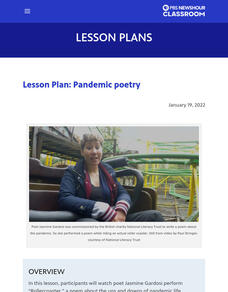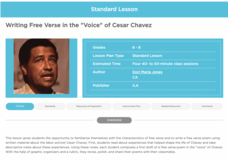Facing History and Ourselves
Bio-poem: Connecting Identity and Poetry
Writing a bio-poem is a great way to have young scholars go below the surface and reflect on who or what has made them who they are. Check out this richly detailed lesson that provides step-by-step directions for crafting a bio-poem.
Albert Shanker Institute
Who Was Bayard Rustin?
Who was Bayard Rustin? Pupils analyze a series of primary source documents to learn about this important figure in the civil rights movement. The lesson contains a short film to watch along with guiding questions and other resources...
Miama-Dade County Public Schools
African Americans and the Civil War
The American Civil War is the theme of this packet of materials prepared for Black History Month. Class members learn about the roles that African Americans played during the Civil War and examine the African-American experience after...
Orange County Department of Education
Poppa's New Pants
Angela Shelf Medearis' Poppa's New Pants provides third graders with an opportunity to stitch together their own narrative filled with sensory details. After reading the story and noting the sensory and concrete details in the tale that...
English Club
Verbs Associated with Travel
An ESL vocabulary worksheet focuses on verbs associated with travel. Intermediate language learners complete 10 sentences using the correct verb, match five verbs with their definitions, and complete five sentences using the correct...
Newseum
You Can’t Say That: Right to Know vs. Security Risk
Print or block? That is the question young journalists debate as part of their study of the freedom of the press. Half the class represents the journalists' legal team, and the other half represents the government's legal team. Teams...
Scholastic
Stressed Out?
Provide tweens and teens with information they need to know about stress with an article that details how stress affects various organs in the body. The article also offers tips for healthy ways to cope with stress.
Cultures of Dignity
Equity and Equality Lesson
Equality does not equal equity and this lesson explains why. Class members compare two images--one labeled "Equality" and the other "Equity." Using the provided discussion questions, they then develop definitions that distinguish between...
Amani Project
Harmony Break! Finding Emotions With Music
Gather the entire family (or class members) for a fun Harmony Break! A volunteer thinks of a color from their Mood Meter that they will express by singing, playing an instrument, or performing a dance. After the performance, the audience...
Amani Project
Harmony Break! Mood Meter Floor Board
The big idea in the fourth lesson from the Amani Project is that people can experience different emotions in precisely the same event. One participant uses their body to express an emotion. Then other participants move to the area of the...
Amani Project
Teach the Mood Meter
The third activity from the Amani Project has youths create a Mood Meter. The colorful meter, divided into red, yellow, blue, and green squares, lets participants indicate not only how they are feeling but also permits them to indicate...
Beyond Benign
Orb-It
How do the products you use rate on a greeness scale? Scholars use a tool to analyze shampoos and cars for their sustainability. They consider factors that affect the environment, the economy, and equity. This is the ninth instructional...
Amani Project
Make an Instrument
Create a little harmony with Amani Project! Young musicians create their instruments using found or recycled objects. As an introduction, class members first experiment with sounds they can make with their bodies (clapping, stomping...
ReadWriteThink
Robert Frost Prompts the Poet in You
A great poem begins with an idea, an image, or an event that evokes a feeling. Middle schoolers read biographical information about Robert Frost and then identify details in three of his poems that reflect his life. Using suggestions...
ReadWriteThink
What is Poetry? Contrasting Poetry and Prose
Introduce middle schoolers to the different strategies used when reading prose versus poetry. Groups use a Venn diagram and a poetry analysis handout to compare the characteristics of an informational text and a poem on the same subject...
ReadWriteThink
Writing Free Verse in the "Voice" of Cesar Chavez
Introduce middle schoolers to free verse poetry with a lesson that has young poets read two free verse poems and list the common characteristics of the form. They then read a passage from Cesar Chavez's biography and a free verse poem...
ReadWriteThink
Persuasive Essay: Environmental Issues
Young environmentalists learn how to craft a persuasive essay about an environmental issue they consider important. After studying the components of a persuasive essay and examining a student model, writers brainstorm possible topics and...
Facing History and Ourselves
Many Voices, One National Identity
To conclude the unit on "Exploring Identity in the United States," pupils consider whether it is possible to combine many voices into one national identity. After creating an identity chart that lists words, phrases, and images that they...
Facing History and Ourselves
Connecting to the Past
Young historians research the connections between their personal histories and the histories of our country to gain a deeper understanding of who they are. To begin, class members write about an object that they consider significant to...
Facing History and Ourselves
Identity and Choices
Timshel! Thou mayest! is the big idea in a activity that reminds learners that they have choices about how they present themselves to others. To begin, individuals rate the degree to which the choices they make each morning are...
Facing History and Ourselves
Identity and Labels
Scholars look at the connections between identity and labels, assumptions, and stereotypes, in a lesson that examines identity in the United States. To set the stage for a discussion of these connections, class members analyze a cartoon,...
Facing History and Ourselves
Identity and Names
Would a rose smell as sweet, as Juliet Capulet asserts, if called by any other name? The importance of names and the connection between names and identity are examined in a activity that explores identity in the United States. After...
Purdue University
Exploring Whirligigs
What's that silly thing spinning in the wind? It's a whirligig! Explore wonderful windy whirligigs with a STEM-based unit that teaches the science and concepts behind these gigs. Scholars discover how gravity and air resistance...

























